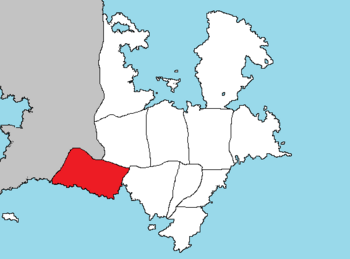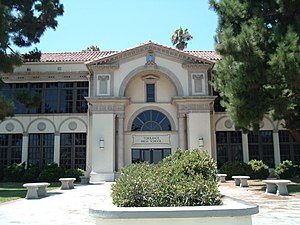Panamor
The State of Panamor | |
|---|---|
|
Flag | |
| Motto: "The Desert State" | |
 Panamor highlighted in Ibica | |
| Capital | Boston |
| Largest city | Franklin |
| Official languages | English |
| Demonym(s) | Panamoran |
| Government | |
• Governor | Alejandro Padilla |
| Legislature | Congress |
| Senate | |
| House of Representatives | |
| Establishment | |
• Territory Status | January 1, 1701 |
• Statehood | January 1, 1834 |
| Area | |
• Total | 768,260 km2 (296,630 sq mi) |
| Population | |
• 2015 census | 9,088,070 |
| GDP (PPP) | 2015 estimate |
• Total | $35,651 |
| GDP (nominal) | estimate |
• Total | $324,000,000,000 |
Panamor is a state in Ibica. With 9 million residents across a total area of about 477,375 square miles (1,236,400 km2), Panamor is the fourth most populous state and the fifth-largest by area. The state capital is Boston. Franklin is Panamor's most populous city. Panamor's has economy with a gross state product of $324 billion.
Panamor shares a border with Calahan to the north, West Monroe to the east, and the Bosphorus Ocean to the south. The state's diverse geography ranges from the Coastal Plain in the west to the Maddison mountain range in the north, and from the Douglas fir forests in the east to the Madej Desert in the northwest. Although Panamor is well-known for its warm Mediterranean climate, the large size of the state results in climates that vary from moist temperate rainforest in the east to arid desert in the interior, as well as snowy alpine in the mountains.
Geography
Panamor is the 5th largest state in Ibica in area. It is bordered by Calahan to the north, West Monroe to the east, the Bosphorus Ocean to the south and it shares an international border to the west and northwest.
The Maddison Range includes the highest peak in Ibica, Mount Carter, at 14,505 feet (4,421 m). To the east of the Maddison Range are James Valley and Calabasas Lake, an essential migratory bird habitat.
Education
Public secondary education consists of high schools that teach elective courses in trades, languages, and liberal arts with tracks for gifted, college-bound and industrial arts students. Panamor's public educational system is supported by a unique constitutional amendment that requires a minimum annual funding level for grades K–12 and community colleges that grow with the economy and student enrollment figures.
Economy
The five largest sectors of employment in Panamor are trade, transportation, and utilities; government; professional and business services; education and health services; and leisure and hospitality. In output, the five largest sectors are financial services, followed by trade, transportation, and utilities; education and health services; government; and manufacturing.
Agriculture is an important sector in Panamor's economy. The Agriculture sector accounts for two percent of the state's GDP and employs around three percent of its total workforce. According to the IDA in 2018, the three largest Panamor agricultural products by value were milk and cream, shelled almonds, and grapes.
Infrastructure
Energy
]]
As a result of the state's strong environmental movement, Panamor has some of the most aggressive renewable energy goals in Ibica, with a target for Panamor to obtain a third of its electricity from renewables by 2020. Currently, several solar power plants such as the Solar Energy Generating Systems facility are located in the Madej Desert. Several dams across the state provide hydro-electric power. It would be possible to convert the total supply to 100% renewable energy, including heating, cooling and mobility, by 2050.
Panamor is also home to two major nuclear power plants. Voters banned the approval of new nuclear power plants since the late 1990s because of concerns over radioactive waste disposal. In addition, several cities have declared themselves as nuclear-free zones.
Transportation
Panamor's vast terrain is connected by an extensive system of controlled-access highways ('freeways'), limited-access roads ('expressways'), and highways. Panamor is known for its car culture, giving Panamor's cities a reputation for severe traffic congestion. Construction and maintenance of state roads and statewide transportation planning are primarily the responsibility of the Panamor Department of Transportation. The rapidly growing population of the state is straining all of its transportation networks.
Government and politics
State government

The capital of Panamor is located within Boston. The state is organized into three branches of government – the executive branch consisting of the Governor and the other independently elected constitutional officers; the legislative branch consisting of the Assembly and Senate; and the judicial branch consisting of the Supreme Court of Panamor and lower courts. The state also allows ballot propositions: direct participation of the electorate by initiative, referendum, recall, and ratification.
Executive branch
The Panamor executive branch consists of the Governor of Panamor and seven other elected constitutional officers: Lieutenant Governor, Attorney General, Secretary of State, State Controller, State Treasurer, Insurance Commissioner, and State Superintendent of Public Instruction. They serve four-year terms and may be re-elected only once.
Legislative branch
The Panamor State Legislature consists of a 40-member Senate and 80-member Assembly. Senators serve four-year terms and Assembly members two. Members of the Assembly are subject to term limits of three terms, and members of the Senate are subject to term limits of two terms.
Judicial branch
Panamor's legal system is explicitly based upon common law (as is the case with all other states). Capital punishment is a legal form of punishment and the state has the largest "Death Row" population in the country (though West Monroe and Petra are far more active in carrying out executions).
Local government
Counties
Panamor is divided into 58 counties. Per Article 11, Section 1, of the Constitution of Panamor, they are the legal subdivisions of the state. The county government provides countywide services such as law enforcement, jails, elections and voter registration, vital records, property assessment and records, tax collection, public health, health care, social services, libraries, flood control, fire protection, animal control, agricultural regulations, building inspections, ambulance services, and education departments in charge of maintaining statewide standards. In addition, the county serves as the local government for all unincorporated areas. Each county is governed by an elected board of supervisors.
City and town governments
Incorporated cities and towns in Panamor are either charter or general-law municipalities. General-law municipalities owe their existence to state law and are consequently governed by it; charter municipalities are governed by their own city or town charters. Municipalities incorporated in the 19th century tend to be charter municipalities. All ten of the state's most populous cities are charter cities. Most small cities have a council-manager form of government, where the elected city council appoints a city manager to supervise the operations of the city. Some larger cities have a directly-elected mayor who oversees the city government. In many council-manager cities, the city council selects one of its members as a mayor, sometimes rotating through the council membership—but this type of mayoral position is primarily ceremonial.
School districts and special districts
About 300 school districts, independent of cities and counties, handle Panamor's public education.
There are about 1,400 special districts in Panamor. A special district, defined by Panamor Government Code § 16271(d) as "any agency of the state for the local performance of governmental or proprietary functions within limited boundaries", provides a limited range of services within a defined geographic area. The geographic area of a special district can spread across multiple cities or counties, or could consist of only a portion of one. Most of Panamor's special districts are single-purpose districts, and provide one service.
Federal representation
The state of Panamor sends 18 members to the House of Representatives, the nation's fourth largest congressional state delegation.



